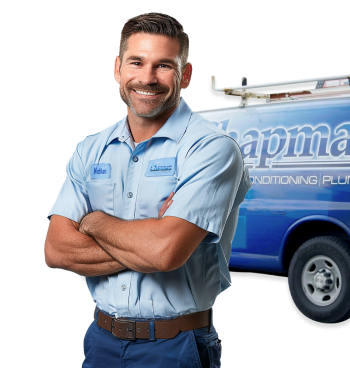Choosing a new heating and cooling system is a long-term commitment, so why not choose a system that will save you money and has a positive impact on the environment?
We are talking about heat pumps, which are a great HVAC system option. Heat pump units are an energy-efficient alternative to traditional furnaces and air conditioners and are continuing to grow in popularity across Central Indiana.
In our most recent blog, the HVAC technicians at Chapman Heating, Air Conditioning and Plumbing discuss what a heat pump is and why you might want to consider buying one for your Indianapolis home.
What is a Heat Pump?
Your traditional HVAC system uses a furnace in the winter and an air conditioner in the summer. A heat pump unit, though, can provide both heating and cooling for year-round comfort.
A heat pump works like an air conditioner in the summer by cooling your home by extracting the warm air in each room and replacing it with cool dry air. It runs in reverse in the winter to heat your home. Because heat pumps transfer heat rather than generate heat, they can provide equivalent space conditioning at a lower cost than a conventional heating or cooling appliance. During the winter, the system will be matched with a backup heating source, most often electric heat for those extremely cold days of winter.
Heat pumps have Seasonal Energy Efficiency Ratio (SEER) ratings like air conditioners and Heating Seasonal Performance Factor (HSPF) ratings for measuring heating efficiency. Higher SEER and HSPF ratings mean greater energy savings.
There are two common types of heat pumps; air-source and geothermal. An air-source heat pump transfers heat between your home and the outside air. Geothermal, or ground-source heat pumps, transfer heat between your home and the ground or the closest water source. Geothermal heat pumps have low operating costs and can be used in climates with more extreme weather.
Misconceptions About Heat Pumps
There is a misconception about heat humps that we would like to clear up. Heat pumps are not the enemy. Sometimes prospective homebuyers are turned off by the thought of using a heat pump instead of a traditional heating and cooling system, perhaps because they are not familiar with these systems. But heat pumps are actually a very efficient alternative to electric heat.
What might turn some people off about heat pumps is the initial cost of equipment, installation costs, the cost of electricity and the potential for increased maintenance costs. While any system will be expensive in the beginning, the return on investment is great with a heat pump. The compressors and refrigerant cycle of the heat pump will compound the productivity of your electric heat in the winter, giving you $2 to $3 of electricity for every dollar you spend.
Raising and lowering a heat pump thermostat will actually raise your bill because it forces the more expensive backup to come on when it would not normally be needed. Be sure to set your thermostat to a comfortable temperature, and don't move it to see increased energy efficiency.
Just like our air conditioners, many of our heat pumps have advanced features, such as two-stage compressors and variable-speed fan operation. These features not only improve the comfort level of your home, but can provide additional energy savings as well.
How Do I Maintain a Heat Pump?
Like all heating and cooling machines, you must perform regular maintenance to keep the machine running in tip-top shape. If you neglect to take care of your heat pump, it could end up costing you more money. You will need to clean or change the air filters once a month depending on the manufacturer's instructions.
Dirty filters and fans will reduce airflow. Most filters will last anywhere from 8 to 12 months. You should also have a professional heating and cooling technician look at your heat pump at least once a year to make sure everything is running smoothly. We typically recommend two tune-ups per year, once in the spring before cooling season and again in the fall before the heating season.
Contact Chapman for Heat Pump Installation Services
Heat pumps are an excellent way for you to save money no matter what season it is. It acts as a furnace and air conditioner, but you're only paying for one machine. It offers long-term cost savings and less dependence on fossil fuels. Your heat pump will supply lower-temperature air than a fossil-fueled furnace, so your heat pump will run for longer periods of time. It delivers steady heating with less energy consumption than the fossil-fueled competition.
Have we sold you on the benefits of having a heat pump installed in your Indianapolis or Central Indiana home? If you're interested in learning more about these energy-efficient systems or would like to schedule installation service, pick up the phone and call Chapman today, or contact us online.
Although it's great to get outside on nice spring, summer and fall days, Americans typically spend about 90% of their time indoors where the concentration of contaminants and pollutants are two to five times greater than the air outside.
When you're cooped up inside, natural airflow is limited. For this reason, it's important to ensure that the air quality in your Indianapolis home is at a high level, especially for those who suffer from allergies, asthma or other respiratory illnesses. Even with your HVAC system running, you are still going to be exposed to much of the same air throughout the day.
What this means is that anything inside your home that compromises air quality is going to stay inside and circulate. Poor air quality can cause illness, trigger allergies and asthma or just make it harder to breathe.
To help keep you and your family healthy year-round, here are a few tips for keeping your indoor air quality fresh and clean.
Be Careful with VOC Cleaning Products
VOC (volatile organic compounds) are solid or liquid cleaning products that emit potent chemicals when used. As you can probably guess, chlorine bleach, furniture polish, aerosol sprays, oven cleaners and rug cleaners are all very common household VOCs.
When these kinds of cleaners are used without precaution, the chemicals can linger in the air and can cause headaches, dizziness, nausea and more.
Whenever possible, use VOCs outside to keep them out of your indoor air circulation. If you must use them indoors, make sure you are in a ventilated area, like your bathroom or kitchen, and can push the chemically tainted air outdoors.
Open Windows When Weather Permits
When the weather is nice, turn off your air conditioner or furnace and let in some fresh air. Open windows can help with circulating fresh air throughout your home. Giving your HVAC a little rest can also help with your energy bill.
Just be careful if you suffer from pollen allergies. While this allows for clean air to enter, it also opens the door for pollen and other outdoor allergies to enter, so act accordingly.
Keep a Healthy Humidity
During the warmer months, dust mites and mold thrive in high humidity levels. If left unchecked, these pollutants and contaminants can take hold and taint your indoor breathing air. Dust mites, mold and mildew are extremely common allergies and can trigger allergy and asthma symptoms.
You may not think about humidity during the fall and winter months, but it is just as important. Low humidity levels create dry air, which helps with the spread of viruses such as the cold and flu.
Maintaining a humidity level of 30 to 50% year-round will keep humidity levels in check. Utilizing a dehumidifier in your home during the summer and a whole house humidifier during the winter will keep your humidity levels at a comfortable level.
Regularly Clean, Vacuum, Mop and Dust
Maintaining a clean home is important in keeping air quality high. Dust, dirt, pet dander and other particles can build up and easily be kicked up from regular home activities.
Although dirt, dust and dander aren't dangerous, they can make breathing difficult and result in coughing and sneezing as well as triggering other allergy and asthma symptoms.
Vacuum carpets and furniture, use cleaning supplies without harmful chemicals and dust and mop on a regular schedule to prevent build up.
Install an Air Purifier
For an extra level of protection, Chapman recommends installing a whole house air purifier or UV light air cleaner to your home's HVAC system. These units can catch pollutants and contaminants such as pet dander, tobacco smoke, dust and allergens so they don't re-enter your home's air supply.
It's also important to change your HVAC filter regularly, typically about every three months. Make sure to read your owner's manual to find the right changing interval for your system.
Contact Chapman for Indoor Air Quality Solutions
If you're prepping for fall and winter and want to make sure your air conditioner and furnace are ready to tackle the tumultuous seasons, give Chapman a call, or contact us online for an inspection or to install indoor air quality solutions in your home.






